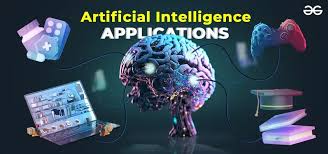
Artificial Intelligence Applications
Author: HNK Globals Institute
Artificial Intelligence (AI) is transforming industries across the globe, leveraging its ability to mimic human intelligence and automate complex processes. AI applications span numerous sectors, bringing both efficiency and innovation. In this description, we explore various key areas where AI is making significant strides, its features, and the advantages it offers to businesses and society.
Key Areas of AI Applications:
Healthcare
AI is revolutionizing healthcare by enabling personalized treatment plans, enhancing diagnostics, and streamlining administrative tasks. Machine learning algorithms help predict patient outcomes and provide insights from medical imaging data. AI-powered robots are also assisting in surgeries with enhanced precision, while natural language processing (NLP) is used to analyze patient records and clinical data.
Advantages: Improved accuracy in diagnostics, faster disease detection, cost reduction in healthcare operations, and the potential for real-time personalized care.Finance
In the finance sector, AI is used for algorithmic trading, fraud detection, customer service, and risk management. AI models analyze vast datasets to predict market trends, and machine learning algorithms identify patterns in transactions, enhancing security. AI chatbots assist customers by answering queries, offering financial advice, and managing portfolios.
Advantages: Increased operational efficiency, reduced fraud, enhanced customer experience, and data-driven investment strategies.Retail and E-commerce
AI applications in retail include personalized shopping experiences, demand forecasting, inventory management, and virtual assistants. AI systems track customer behavior and recommend products, while machine learning models optimize supply chains, ensuring that products are available when needed.
Advantages: Better customer engagement, higher conversion rates, efficient inventory management, and reduced operational costs.Transportation
Autonomous vehicles are one of the most notable AI applications in transportation. AI algorithms are used to enable self-driving cars, optimize traffic flow, and enhance route planning for delivery and logistics services. AI also aids in predictive maintenance of vehicles, reducing downtime.
Advantages: Safer roads, reduced human errors, efficient traffic management, and cost-effective logistics operations.Manufacturing
In manufacturing, AI enhances productivity through automation, predictive maintenance, and quality control. Robots powered by AI can perform repetitive tasks with high precision, while machine learning models forecast equipment failures before they occur, minimizing downtime. AI also helps optimize production schedules.
Advantages: Increased production efficiency, reduced machine failures, cost savings, and improved product quality.Education
AI is transforming education by offering personalized learning experiences, grading automation, and administrative support. AI-powered platforms adapt to student learning styles and pace, delivering customized content. Virtual tutors and chatbots provide real-time help to students.
Advantages: Enhanced learning outcomes, reduced administrative workload, and accessible education for all.Customer Service
AI-driven chatbots and virtual assistants have greatly improved customer service by handling inquiries, troubleshooting issues, and processing transactions. These systems use NLP to understand customer queries and provide relevant responses, reducing the need for human intervention.
Advantages: Improved response times, 24/7 support availability, reduced operational costs, and higher customer satisfaction.Cybersecurity
AI is a powerful tool in enhancing cybersecurity. Machine learning algorithms can identify and predict potential threats, monitor network traffic for anomalies, and protect against cyberattacks. AI-based systems can adapt to new threats by learning from previous attacks.
Advantages: Real-time threat detection, proactive defense strategies, and reduced risks of cyberattacks.Entertainment and Media
In entertainment, AI is used for content recommendations, video editing, and game development. Streaming platforms like Netflix use AI algorithms to suggest shows and movies based on user preferences. AI is also applied in creating realistic visual effects in movies and gaming environments.
Advantages: Personalized user experiences, efficient content creation, and improved entertainment offerings.
Features of AI Applications:
- Machine Learning: AI systems use machine learning algorithms to analyze data, detect patterns, and make predictions without human intervention.
- Natural Language Processing: AI can understand, interpret, and respond to human language, enabling virtual assistants and chatbots to engage in conversations.
- Robotic Process Automation: AI powers robots to perform tasks that would otherwise require human intervention, streamlining processes in various industries.
- Deep Learning: AI uses deep neural networks to process large datasets, improving accuracy and efficiency in areas like image recognition and natural language understanding.
- Predictive Analytics: AI applications forecast future trends and outcomes based on historical data, enabling better decision-making across industries.
Advantages of AI Applications:
- Efficiency: AI automates routine tasks, reducing time and costs associated with manual labor.
- Accuracy: Machine learning algorithms can process vast amounts of data with high precision, reducing human error.
- Personalization: AI tailors services and products to individual preferences, enhancing user experiences.
- 24/7 Availability: AI-powered systems, such as chatbots, operate around the clock, providing uninterrupted service.
- Innovation: AI fosters new product and service development, creating opportunities for growth and competitive advantage.
Conclusion
The applications of Artificial Intelligence are vast and continue to expand across all industries. From healthcare and finance to education and entertainment, AI is driving transformation by enhancing efficiency, improving accuracy, and providing innovative solutions. As the technology evolves, we can expect AI to play an even greater role in shaping the future of business, society, and the economy.
Author: HNK Globals Institute








